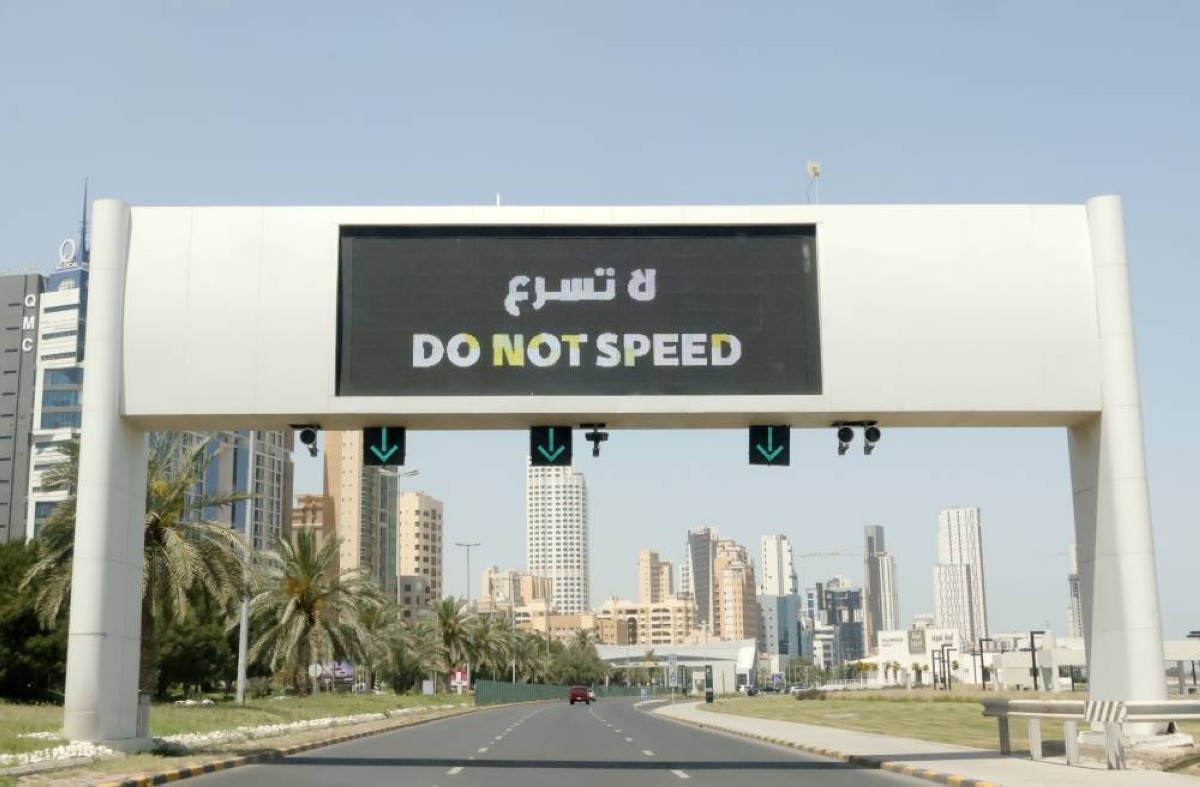KUWAIT: Kuwait has officially begun implementing a series of stringent amendments to its traffic laws, effective Tuesday, following the issuance of Decree Law No. 5 of 2025. The newly enforced regulations aim to enhance road safety and curb reckless driving by introducing significantly harsher penalties for serious violations. Among the most notable changes is the crackdown on driving under the influence of drugs or alcohol. Offenders now face fines ranging from KD 1,000 to KD 5,000, in addition to imprisonment for a period of one to five years. The move underscores the authorities’ commitment to promoting safer roads and deterring dangerous driving behaviors.
Reckless driving and crossing red lights are now punishable with a KD 150 fine, and may also lead to legal proceedings, including jail time of up to three years and additional fines. Illegal street racing, operating vehicles in prohibited areas, and transporting passengers without a license also carry a KD 150 fine and may result in imprisonment of one to three years or fines between KD 600 and KD 1,000, or both.
Distracted driving has received special attention in the amendments. Actions such as using a mobile phone, applying makeup, or eating while driving now incur a KD 75 fine. The fine for using a mobile phone while driving has been increased from KD 5 to KD 75. Speeding violations are now penalized based on the extent of the infraction, with fines ranging between KD 70 and KD 150. Not wearing a seatbelt will result in a KD 30 fine, up from the previous KD 10. Failure to give way to emergency vehicles such as police, ambulances, fire, or civil defense services can lead to a KD 75 fine, and in some cases, imprisonment for up to three months.
Additional violations include producing excessive noise or emissions from vehicles KD 75, illegal parking KD 15, and parking in spaces designated for people with disabilities KD 150, and driving on sidewalks or shoulders KD 30 to 75. Driving without the vehicle owner’s knowledge carries a fine of KD 30. Violating road markings or ignoring traffic signs incurs a KD 50 fine, as does driving below the minimum speed limit. Child safety violations such as seating a child under 10 years old in the front or not using a child seat also carry a KD 50 fine. Cutting in line at main entrances is fined KD 50.
As part of broader changes, expatriates are now limited to owning only one vehicle registered in their name. Additionally, drivers who receive their license for the first time may have it revoked if they commit two violations within the first year. The law also outlines the conditions for vehicle impoundment, including fees, and terms of sale for unclaimed vehicles, as determined by the Minister of Interior.
The amendments also grant broader authority to police officers, including the power to arrest drivers on the spot for serious traffic violations. Notably, traffic officers now have judicial powers even when off-duty or dressed in civilian attire, allowing them to enforce the law in real time. In cases that require vehicle or driver detention, they may call on official patrols or traffic investigators to intervene. Bicycle and electric scooter riders are also included in the new regulations. Violations by cyclists are subject to a KD 20 on-the-spot settlement and court-imposed fines ranging from KD 45 to 75.
To support the new law, Kuwait’s Ministry of Interior has deployed a network of advanced traffic surveillance systems, including sixth-generation AI-powered smart cameras. These cameras can detect a variety of violations such as using a mobile phone while driving, not wearing a seatbelt, illegal turns, driving in the wrong direction, and stopping in yellow-box junctions. "Point-to-point” speed cameras calculate the time it takes a vehicle to travel between two fixed points, issuing fines if the vehicle travels faster than the allowed speed.
The new system also includes multi-task panoramic cameras capable of identifying illegal parking, sidewalk driving, and traffic congestion, thus reducing the need for on-site patrols. Intersection cameras monitor violations such as crossing stop lines, failure to wear a seatbelt, and mobile phone use. Temporary cameras are placed where permanent units are undergoing maintenance or in locations without fixed surveillance. Mobile cameras mounted on vehicles patrol highways and remote areas, allowing flexible deployment to enforce speed limit and deter reckless driving.
Among the most notable additions is the "Rased”. This battery-powered camera is easy to relocate and is used to monitor high-violation zones. It has already recorded thousands of violations related to seatbelt use and mobile phone use, and has contributed to a 55 percent decrease in red-light violations. These developments are part of a comprehensive plan to modernize traffic enforcement in Kuwait, aiming to reduce accidents, promote responsible driving, and enhance safety on the roads.



